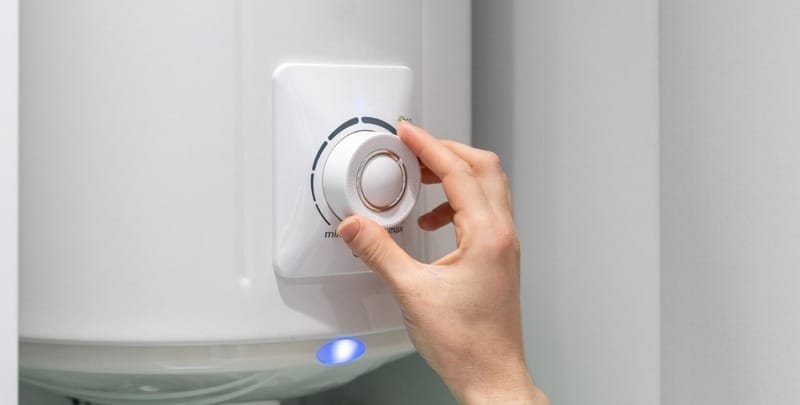
The Pros and Cons of Heat Pump Hot Water Systems
Let’s dive into the world of innovative plumbing technology – heat pump hot water systems. In particular, we’re going to examine the main benefits and some of the drawbacks.
We’re here to provide you with an easy-to-understand guide, showcasing the pros and cons of these systems. No jargon or technical lingo – just helpful information.
What is a Heat Pump Water Heater?
Think of a heat pump hot water system as a reverse refrigerator.
Instead of pulling heat from inside the fridge to cool it down, a heat pump water heater pulls heat from the surrounding air, increases its temperature, and funnels it back to heat water.
This method of generating heat directly helps reduce energy use.
How Does a Heat Pump System Work?
Every heat pump system, including a heat pump hot water system, operates on the simple yet effective principle of heat transfer.
As its name implies, a heat pump literally “pumps” or moves heat from one place to another. But instead of generating heat directly like conventional electric water heaters, a heat pump uses a small amount of electricity to move or pump heat from one location to another.
The operation of a heat pump system relies heavily on the surrounding air temperature.
For example, a heat pump system draws heat from the surrounding air and pumps it into your home during the colder months, while in the warm months, it does the opposite – pulling heat from your home and releasing it into the outdoors.
The heat pump hot water system can do this because it operates on a refrigeration cycle similar to an air conditioner or a refrigerator. It involves a refrigerant that changes from a liquid to a gas.
Here’s a general principle of how the heat pump hot water system operates:
- The heat pump compressor revs up the refrigeration cycle by pulling in the refrigerant.
- The refrigerant, now a cool gas, moves into the outdoor coil where it absorbs heat from the surrounding air and turns into warmer gas.
- That warm gas moves back to the compressor. Due to this process, the refrigerant starts to emit heat and cools back to a liquid form.
- The heat pump transfers the heat to the awaiting water in the heat exchanger and heats the water to a comfortable temperature.
- The cooled liquid refrigerant now transforms back into a gas and the cycle is ready to restart.
If you’ve been wondering: “How much does a heat pump hot water system cost in Australia?”, the answer is: “It depends.”
Factors include the system’s complexity, size, style and the costs associated with hiring a professional for proper installation. We can’t provide an accurate number, as price varies from provider to provider and location to location.

Why You Should Consider a Heat Pump
Heat pump water heaters, or hot water heat pumps, have become a hit with Aussies due to their energy efficiency.
Many would argue that their greatest advantage over conventional water heaters is their ability to heat a significant amount of water using less energy. Let’s dive into why these systems might be a smart investment for your household.
Heat Pumps are Energy Efficient
If you care about your energy costs and are mindful of your environmental pawprint, heat pump water heaters could be for you.
Instead of heating water directly, these systems simply move existing heat, which requires way less energy. If you’re keen to reduce your electricity bills, these pump hot water systems could be your new best mate.
One thing to note is that a modern heat pump hot water system is at its most efficient in warm climates. It draws heat from the ambient air, so understandably, it has more heat to draw from when the air temperature is hotter.
However, don’t despair if you live in colder climates. Modern heat pumps can still generate heat directly and operate efficiently even when the mercury dips, although they may work a little harder during cold snaps.
Your Answer for Constant Hot Water Supply
Let’s face it, there’s nothing worse than running short of hot water when you’re in the middle of a relaxing bath or a refreshing shower. This is where a heat pump water heater can be your saviour.
These systems typically feature a water storage tank that stores and maintains hot water ready for use. There’s no waiting around for the water to heat up – just instant hot water satisfaction!
As with anything in life though, there are potential downsides. While the size of the storage tank in a heat pumps hot water system ensures a good supply of hot water for the household’s needs, it’s important to choose the right size for your needs.
Too small, and you could run out of hot water. Too large, and you’re wasting energy heating water that you’re not using. A professional can help you make this decision.
Key Benefits of Heat Pump Hot Water
In a nutshell, here are the some of the main pros of heat pump hot water systems:
- Unmatched energy efficiency: One of the major advantages of heat pump hot water systems lies in their energy efficiency, which surpasses conventional water heaters. Requiring less energy to heat the water, these systems result in lower energy consumption, translating to reduced energy costs and a smaller carbon footprint.
- Dependable hot water supply: For households with high hot water demands, heat pump water heaters are a reliable solution, guaranteeing a constant supply of hot water. These systems typically consist of a storage tank, ensuring ready access to hot water for daily activities like bathing, washing, and cleaning.
- Adaptability across diverse climates: Modern heat pumps are built to function efficiently in a range of temperatures, even when the mercury dips. Providing steady performance during moderate temperature drops, these systems demonstrate their versatility in various climates.

Recognised Drawbacks and Considerations
While heat pump water heaters are highly efficient, they also have their faults. Let’s take a look at some of the cons of heat pumps:
- Performance limitations in cold climates: While heat pump systems are generally adaptable to cold temperatures, their efficiency may decline in colder regions. In extremely cold conditions, the pump has to work harder to extract heat from the air, potentially consuming more energy in the process, making it less suitable for very cold climates.
- Spatial and siting considerations: Because heat pump hot water systems require a certain amount of space to function optimally, they may not be well-suited for compact apartments or homes that lack adequate outdoor space or a furnace room. Moreover, whether the system is installed indoors or outdoors, the location should be carefully chosen, sheltered from extreme weather conditions and well-ventilated to prevent humidity and condensation issues.
- Potential noise nuisance: Heat pumps make noise during their operation, primarily due to compressor vibrations. This noise can be intrusive in quiet residential settings, so when planning a heat pumps installation, it’s best to avoid proximity to bedrooms or other rooms where silence is preferred.
- The importance of professional installation: For a heat pump hot water system to perform effectively, proper installation is crucial. Engaging a professional for installation not only ensures that the system is installed correctly but also helps avoid potential issues that might arise due to improperly placed components or insufficient ventilation. Moreover, hiring a professional installer can provide guidance on the optimal system type and size for a given space, considering the local climate and specific homeowner requirements.
Making an Informed Choice for Your Home
When contemplating a hot water system for your home, the evaluation should not just be limited to potential energy savings.
It’s essential to consider your household’s hot water needs, your local climate, and whether the benefits offered by heat pumps would justify the initial costs.
While heat pumps may present considerable advantages over conventional water heaters or electric hot water systems, you need to assess whether the system is suitable for your specific circumstances.
Choose a heat pump hot water system not solely for its modern and efficient characteristics but because it aligns with your lifestyle and will meet your household’s needs.
As these systems are best installed professionally, prior to making a switch, it’s prudent to consult a knowledgeable expert who can provide precise insights tailored to your situation.
In conclusion, heat pump hot water systems stand as a testament to technological innovation in residential heating solutions. These systems offer a blend of efficiency and environmental sustainability – the twin goals of modern energy strategy.
Nevertheless, they carry certain caveats that homeowners should be mindful of before installation. Armed with the right information and professional guidance, you can venture towards a heat pumps hot water system – a journey towards a more energy-efficient and possibly more cost-effective solution for your home hot water heating.
Please note: This information is provided for advice purposes only. Regulations differ from state to state, so please consult your local authorities or an industry professional before proceeding with any work. See our Terms & Conditions here.
Published: 20 Feb, 2024